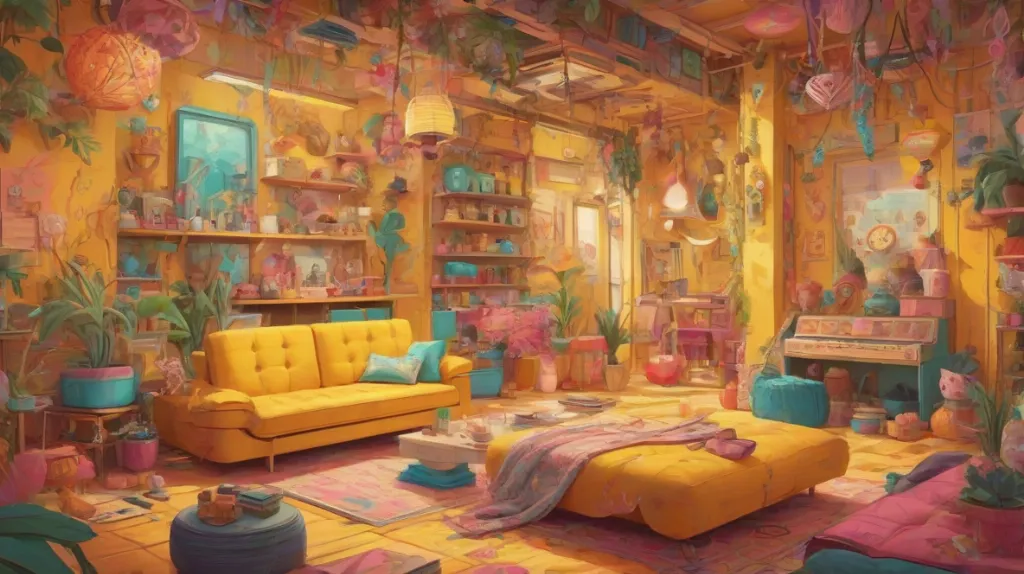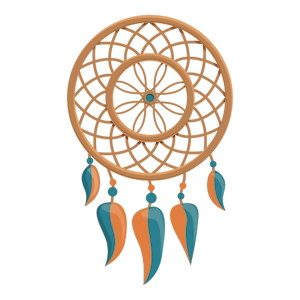What Does It Mean to Dream of Kitsch ?
Posted on: November 3, 2024
Last updated: February 19, 2025
Kitsch symbolizes the struggle between authenticity and superficiality, evoking nostalgia and prompting introspection about personal identity. It reflects societal influences on individual tastes while encouraging a balance between self-acceptance and external expectations.

What does Kitsch mean in a dream?
Kitsch, often perceived as an aesthetic that is overly sentimental or gaudy, carries a unique significance in the realm of dreams. In the context of a dream book, encountering kitsch elements may reflect an individual’s struggle with authenticity and the superficial aspects of life. It invites introspection about what is genuinely valued versus what is merely a facade. The dreamer might find themselves questioning their own tastes and preferences, leading to a deeper understanding of their personal identity.
Moreover, kitsch can symbolize nostalgia, often evoking memories of a simpler time or an idealized past. This longing for the ‘good old days’ can manifest in dreams, prompting the dreamer to explore unresolved feelings related to their history. The presence of kitsch in a dream may also serve as a reminder to embrace the whimsical and playful aspects of life, suggesting that not everything needs to be serious or profound.
In a broader sense, kitsch can represent societal trends and collective tastes, highlighting how cultural influences shape individual perceptions. The dreamer might find themselves reflecting on how societal pressures affect their choices and preferences. This exploration can lead to a greater awareness of the impact of external factors on personal identity and self-expression. The kitsch aesthetic can also serve as a mirror, revealing the dreamer’s inner conflicts regarding conformity and individuality.
Ultimately, the presence of kitsch in dreams encourages a balance between self-acceptance and societal expectations. It invites the dreamer to embrace their unique tastes while remaining aware of the influences that shape them. By analyzing the role of kitsch in their dreams, individuals can gain valuable insights into their desires, values, and the complexities of navigating a world filled with both authenticity and artifice.
Meaning in dream books
Conflict Between Authenticity and Conformity
Diving into the psychoanalytical realm, kitsch in dreams may represent an internal conflict between the desire for authenticity and the pressure to conform to societal expectations. It reflects the struggle of the dreamer to reconcile their true self with the roles they feel compelled to play.
Fear of Judgment
Dreaming of kitsch can also indicate a fear of judgment from others. The dreamer may be concerned about how their tastes and preferences are perceived, leading to feelings of insecurity and self-doubt.
Desire for Acceptance
Lastly, kitsch may symbolize a deep-seated desire for acceptance and belonging. The dreamer might be yearning for connection and validation, often seeking it in places or through things that are considered ‘trendy’ or ‘popular’, even if they don’t resonate on a personal level.
Superficiality and Illusion
The presence of kitsch in a dream often symbolizes a tendency to embrace superficiality and illusion in one’s life. It suggests that the dreamer may be surrounded by or attracted to things that lack depth or authenticity, indicating a need to reflect on what truly matters.
Repressed Creativity
Kitsch can also represent repressed creativity or a longing for self-expression. Dreaming of kitsch may point to the dreamer’s desire to break free from societal norms and embrace their unique artistic vision, even if it seems unconventional or out of place.
Escapism and Nostalgia
This symbol may highlight a longing for simpler times or a desire to escape from the complexities of modern life. Kitsch often evokes nostalgia, and its appearance in dreams could indicate that the dreamer is seeking comfort in memories or simpler pleasures.
Kitsch in different cultural contexts in dreams
In the realm of dreams, the concept of kitsch often emerges as a fascinating symbol, reflecting our cultural perceptions and emotional responses. In Western culture, kitsch is frequently associated with art and design that is considered to be in poor taste but is appreciated in an ironic or nostalgic manner. This duality can manifest in dreams, where the presence of kitsch may symbolize a longing for simpler times or a critique of modernity. The dreamer might find themselves surrounded by gaudy decorations or overly sentimental objects, prompting a reflection on their own values and the societal norms that shape their reality.
In Slavic cultures, the perception of kitsch can take on a different hue, often intertwined with folklore and tradition. Here, kitsch may embody the warmth of familial bonds and the nostalgia of childhood memories. Dreams featuring kitsch elements might evoke a sense of belonging or a desire to reconnect with one’s roots. The dreamer could be navigating through a landscape filled with vibrant colors and exaggerated forms, symbolizing the richness of cultural heritage that, while perhaps deemed kitsch by outsiders, holds profound meaning within the community.
In Eastern cultures, the interpretation of kitsch often diverges, blending with spiritual and philosophical undertones. Here, kitsch can represent the clash between tradition and modernity, where dreams might depict a struggle between the authentic and the superficial. The dreamer may encounter kitsch symbols that challenge their understanding of beauty and value, leading to introspection about their own identity within a rapidly changing world. This tension can serve as a catalyst for personal growth, prompting the dreamer to reconcile their desires with societal expectations.
Across various cultures, the symbolism of kitsch in dreams invites a deeper exploration of our emotional landscapes. It encourages us to examine the layers of meaning behind our aesthetic choices and the societal influences that shape them. Whether viewed through a lens of irony, nostalgia, or cultural pride, kitsch serves as a mirror reflecting our innermost thoughts and feelings, urging us to embrace the complexities of our identities and the world around us.
Kitsch in other contexts of use
Kitsch in Dreams: Other Contexts
Experiencing kitsch in a dream can evoke a range of emotions and interpretations. Here are 35 contexts in which kitsch may appear, each offering a unique insight into your subconscious.
Overly decorative room
This may symbolize a desire for comfort and familiarity, but also a warning against superficiality in your life.
Brightly colored furniture
This could indicate a longing for vibrancy and joy, or a critique of your current environment’s lack of excitement.
Cheap souvenirs
Dreaming of these items may reflect feelings of nostalgia or a reminder to value genuine experiences over material possessions.
Excessive use of glitter
This might suggest a need for attention or a fear of being overlooked, emphasizing the importance of authenticity.
Cartoonish artwork
This could represent a playful side of your personality, or a desire to escape from the seriousness of life.
Novelty items
These may symbolize fleeting pleasures or distractions that prevent you from addressing deeper issues.
Plastic flowers
This could indicate a situation or relationship that lacks authenticity, urging you to seek something more genuine.
Gaudy clothing
Wearing such attire in a dream may reflect insecurities about self-image or a desire to stand out.
Over-the-top decorations
This may signify a need to impress others or a fear of being judged for your choices.
Exaggerated expressions
Seeing exaggerated emotions in others might highlight your own struggles with expressing feelings authentically.
Retro memorabilia
This could indicate a longing for simpler times or a need to reconnect with your past.
Theme parties
Dreaming of such events may symbolize a desire for fun and connection, but also a fear of losing your individuality.
Cheesy romance
This might reflect your views on love and relationships, questioning whether you seek depth or are content with superficial connections.
Overly sweet desserts
This could represent indulgence or a craving for pleasure, but also caution against excess.
Funny hats
Wearing a silly hat may symbolize a playful attitude towards life or a fear of taking things too seriously.
Bright neon lights
This may indicate a desire for excitement and adventure, or a distraction from deeper issues.
Campy movies
Watching these in a dream might reflect your appreciation for humor, but also a critique of your current situation’s absurdity.
Unusual pets
This could symbolize a desire for uniqueness or a need to embrace your eccentricities.
Decorative trinkets
These may represent the clutter in your life, urging you to declutter both physically and emotionally.
Faux fur
This might indicate a longing for warmth and comfort, but also a reminder to seek authenticity.
Whimsical landscapes
Dreaming of such settings may reflect your creative side or a desire to escape reality.
Overly romantic settings
This could symbolize your desires for love and connection, but also a critique of unrealistic expectations.
Cartoon characters
Seeing these figures may reflect your inner child or a desire to embrace playfulness in your life.
Colorful patterns
This might indicate a need for self-expression and individuality, or a distraction from deeper feelings.
Quirky home decor
This could symbolize your unique tastes and preferences, or a desire to stand out in a conformist world.
Excessive use of patterns
This may suggest confusion or chaos in your life, urging you to find clarity.
Fun and silly games
Playing these in a dream may reflect your need for joy and laughter, or a desire to escape responsibilities.
Childhood toys
Dreaming of these items may evoke nostalgia and a longing for simpler times, reminding you to embrace your inner child.
Brightly painted walls
This could symbolize a need for change and renewal in your life, or a desire to express yourself more boldly.
Exaggerated fashion trends
This may reflect societal pressures or your own struggles with self-identity and acceptance.
Funny commercials
Seeing these in a dream might indicate your awareness of consumer culture and its impact on your values.
Overly sentimental gifts
This could symbolize a longing for connection and love, or a reminder to appreciate the thought behind gestures.
Theme park rides
Dreaming of these experiences may reflect your desire for adventure and thrill, or a fear of losing control.
Over-the-top celebrations
This might signify a need for recognition and validation, or a critique of societal expectations surrounding success.


Comments posted under the entry: 0
The user must be logged in to comment or view comments.